Texas Tech University Archives
TTU Women's History Month
Beginning in 2014, the University Archives sponsors a "Women Who Shaped Texas Tech" exhibit as part of Women's History Month, which is celebrated each March. The annual exhibit was moved to April in 2016 to coincide with the annual women's conference hosted by the TTU Women's and Gender Studies Program. Below are excerpts from some of the previous years' exhibits as well as photos and news clippings featured on the University Archives' Facebook site.
Women's History Month (2016)
The "Women Who Shaped Texas Tech" exhibit was hosted in two buildings for the spring of 2016. The larger exhibit in the Croslin Room of the Library was presented in 6 glass exhibit cases and 11 standing panels, and featured the honorees from the previous two years' exhibits plus numerous artifacts and photographs spanning the university's 91 years. Six women "firsts" were selected for the oversized posters that filled 6 of the large panels.


The exhibit case in the Southwest Collection's Coronelli Globe Rotunda featured this year's diverse selection of female honorees. This year's honorees were Hortense Williams Dixon, Maxine Fry, Edna Maynard Gott, Ann Lynch, and Marsha Sharp.
Edna Maynard Gott received her M.S. degree from Texas Tech in 1954 and began her teaching career as an instructor in Economics here. For more than a decade she battled with the department and university administration for equality in teaching rank, promotion and tenure. In the spring of 1973 she was promoted to the rank of Assistant Professor. Nine years later, Gott became the first women to achieve tenure in the Department of Economics.
Hortense Williams Dixon holds the distinction of being the first African American to graduate from Texas Tech with a doctorate degree. She pursued getting a Ph.D. not to be a barrier breaker but because she understood it was a necessity in order to be successful in higher education. Dixon already held a professor position at Texas Southern University and, following her graduation from Texas Tech in 1970, returned to her Associate Professor position in home economics at TSU.
The very outgoing Maxine Fry attended Texas Tech from 1934-1938, along with her equally outgoing sister. She was an active contributor to campus groups and activities and was named a 1938 Sun Bowl Princess. In May of 1937 she became the first elected female president of the Student Council. With the help of classmate Arch Lamb and the Saddle Tramps, Fry was able to successfully reinstate the school’s bonfire tradition.
An Animal Science major, Anne Lynch participated in Texas Tech’s Block and Bridle Club and the Rodeo Club. She had grown up around horses and began riding Happy V, the university's horse mascot, while she working at the Texas Tech Farm. When told that she could not apply to serve as the Masked Rider Lynch refused to back down and applied anyway, despite skepticism leveled at her based on her gender. In 1974 she was selected as the 13th Masked Rider and thus became the first woman to hold the honored position. Her proficiency in this role paved the way for future women to have the opportunity to try out for the Masked Rider.
Marsha Sharp is best known as being the head coach of the Lady Raiders during their 1993 national championship season. However, her true legacy is that she has been an inspirational basketball coach and community leader for more than 35 years. Under her leadership she achieved a high graduation percentage with her athletes, many of whom went on to have successful and high profile careers. In 2004, she established the Marsha Sharp Center for Student-Athletes. As of 2016, she is one of only four women to have a campus building named solely after a woman.
Women's History Month (2015)
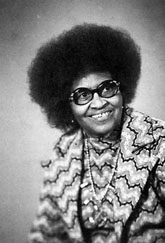 The exhibit,
which was available for viewing in the Coronelli Globe Rotunda Room of the
Southwest Collection/Special Collections Library, was a continuation of the
Women Who Shaped Texas Tech exhibit from 2014. This year's honorees were groundbreaking, plucky, and ambitious alumni
and faculty who have shaped Texas Tech’s history. Honored were Lucille S.
Graves, Ophelia Powell-Malone, Mary Jeanne van Appledorn, and Faye LaVerne Bumpass.
The exhibit,
which was available for viewing in the Coronelli Globe Rotunda Room of the
Southwest Collection/Special Collections Library, was a continuation of the
Women Who Shaped Texas Tech exhibit from 2014. This year's honorees were groundbreaking, plucky, and ambitious alumni
and faculty who have shaped Texas Tech’s history. Honored were Lucille S.
Graves, Ophelia Powell-Malone, Mary Jeanne van Appledorn, and Faye LaVerne Bumpass.
Mrs. Lucille S. Graves is recognized as being the first African American student enrolled at Texas Tech. It was her persistent petitioning for entrance that paved the way for other African Americans to attend Texas Tech. In her oral history interview she discussed how, when repeatedly refused entrance into the college on the grounds that its charter specifically stated it was a college for white students, she sought the help of the NAACP. Mrs. Graves, who already held a bachelor’s degree, was invited at the last minute by the college’s president to register for graduate courses in the summer of 1961. Her quiet enrollment led to a peaceful, non-violent integration of the traditionally white college.
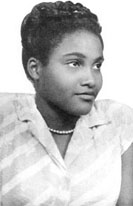 Ophelia Powell-Malone holds a place
in Texas Tech history as the first African American to graduate with a bachelor's degree. She transferred from Huston-Tillotson University
in Austin, Texas, to attend Texas Tech shortly after the college quietly integrated. A home economics major, Powell-Malone received her degree
in 1964 and went on to become a teacher in New Mexico. Later she worked as a dietitian at Langston University and in nursing homes in Lubbock and Houston.
Ophelia Powell-Malone holds a place
in Texas Tech history as the first African American to graduate with a bachelor's degree. She transferred from Huston-Tillotson University
in Austin, Texas, to attend Texas Tech shortly after the college quietly integrated. A home economics major, Powell-Malone received her degree
in 1964 and went on to become a teacher in New Mexico. Later she worked as a dietitian at Langston University and in nursing homes in Lubbock and Houston.
Additionally, for the month of March, the University Archives'
Facebook
page is exhibiting new images each weekday. Some of these images include:
Left: Pictured are two important women in Texas Tech history. Native
Lubbockite Diane Parson was the first African American woman to receive an
athletic scholarship. Diane was an acomplished runner and, as you may know,
Texas Tech has a long history of exceptional track athletes. In this 1976
University Daily article Diane is pictured with Jeannine McHaney. Jeannine
helped establish the women's athletics program at Texas Tech, was the first
Women's Athletics Department Director, and was the first woman to be
inducted into the Texas Tech Athletic Hall of Honor.
Right: Additionally, Cheryl Greer, in 1976, became the first women in
Tech history to receive an athletic scholarship. Susie Lynch, also pictured,
was the first coach of the official women's basketball team.
Women's History Month (2014) In 2014, the "Women Who Shaped Texas Tech" exhibit was created to promote women's history at
Texas Tech and to highlight the wide variety of contributions women have made to the university and surrounding communities. The honorees
were Margaret Watson Weeks, Mary Woodward Doak, and Elizabeth Howard West. The foundations of early women’s history at Texas Tech
lie largely with the School of Home Economics. Its building was one of the
nine original campus structures and housed parts of the School of
Agriculture, the bookstore, the college physician, and the Geology
Department when it opened.
Though the diligence and dedication of these three
early female faculty members Texas Tech became and remains an institution dedicated to providing an excellent education for women. ~B. Lynn Whitfield,
University Archivist (1) Rushing, Jane Gilmore and Kline A. Nall. Evolution of a University.
Madrona Press, Inc.: Austin, 1975.
Tech Tips were handbooks for male & female students that described
Housing & Dining policies and fees, and the various student organizations on
campus. Originally published only for women it was later thought that
perhaps the men could use some guidance as well. 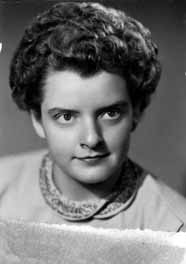 As an educator, Dr. Mary Jeanne van Appledorn taught a wide range of courses
at Texas Tech from 1950-2008, including undergraduate music theory and graduate composition courses.
She served as chairman of the Division of Music Literature and Theory from 1950-1968 in the School of Music and played an important role in the development
of the curriculum of the undergraduate and graduate music degrees. She also founded and served as chairman of the annual Symposium of Contemporary Music at
Texas Tech from 1951-1981, and obtained the commission of many new works by renowned composers such as Dr. Howard Hanson (Streams in the Desert, 1969). In 1989,
she was named a Paul Whitfield Horn Professor, the highest faculty rank obtainable at Texas Tech University. Before her passing in 2014, Mary Jeanne
held the distinction of being one of the longest serving faculty members at Texas Tech and her papers reside in the University Archives.
As an educator, Dr. Mary Jeanne van Appledorn taught a wide range of courses
at Texas Tech from 1950-2008, including undergraduate music theory and graduate composition courses.
She served as chairman of the Division of Music Literature and Theory from 1950-1968 in the School of Music and played an important role in the development
of the curriculum of the undergraduate and graduate music degrees. She also founded and served as chairman of the annual Symposium of Contemporary Music at
Texas Tech from 1951-1981, and obtained the commission of many new works by renowned composers such as Dr. Howard Hanson (Streams in the Desert, 1969). In 1989,
she was named a Paul Whitfield Horn Professor, the highest faculty rank obtainable at Texas Tech University. Before her passing in 2014, Mary Jeanne
held the distinction of being one of the longest serving faculty members at Texas Tech and her papers reside in the University Archives.
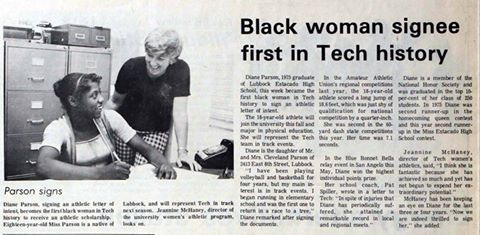
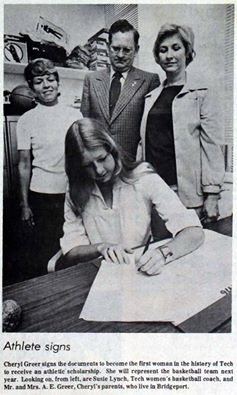
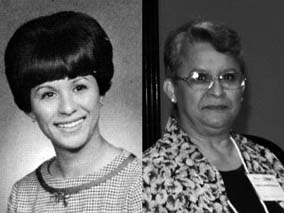 In
the February 15-22, 1979 issue of El Editor,
Anita Carmona Harrison was recognized as the first native Chicana Lubbockite to graduate from Texas Tech. She was also cited as the first Mexican to go
through the entire Lubbock School system and graduate from Texas Tech. Anita received her B.S. in Elementary Education from Texas Tech in 1967 and
completed some graduate work here as well. In 1969, she, along with colleagues Maria Salas, Lorene Munoz, and Maria De Leon, taught Bilingual
Kindergarten and developed Lubbock ISD’s first Curriculum Guide for Bilingual Kindergarten. Anita retired from LISD in 1999, after almost 30
years of teaching.
In
the February 15-22, 1979 issue of El Editor,
Anita Carmona Harrison was recognized as the first native Chicana Lubbockite to graduate from Texas Tech. She was also cited as the first Mexican to go
through the entire Lubbock School system and graduate from Texas Tech. Anita received her B.S. in Elementary Education from Texas Tech in 1967 and
completed some graduate work here as well. In 1969, she, along with colleagues Maria Salas, Lorene Munoz, and Maria De Leon, taught Bilingual
Kindergarten and developed Lubbock ISD’s first Curriculum Guide for Bilingual Kindergarten. Anita retired from LISD in 1999, after almost 30
years of teaching. E3_47242_small.jpg) Laura
Song, a native from Korea, was the first asian student to graduate from Texas Tech. She received a Bachelor's of Science degree in Home Economics on
June 5, 1933. In this photo from her senior year, Laura is wearing her native Korean dress and is standing at the door of the Home Management
House. She lived in the house for several weeks to complete her degree requirements. The house is now called The Cottage and it was beautifully
restored in 2014.
Laura
Song, a native from Korea, was the first asian student to graduate from Texas Tech. She received a Bachelor's of Science degree in Home Economics on
June 5, 1933. In this photo from her senior year, Laura is wearing her native Korean dress and is standing at the door of the Home Management
House. She lived in the house for several weeks to complete her degree requirements. The house is now called The Cottage and it was beautifully
restored in 2014.
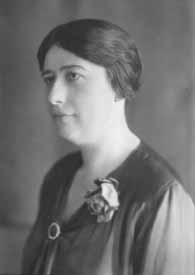 The original faculty of Home Economics was made up of
three women, of whom one, Margaret Watson Weeks, would emerge as one of
three important figures in the history of women at Texas Tech. As the Dean of the School of Home
Economics for over twenty-five years, Weeks shaped the School’s programs,
courses, and the cultural and social activities for women on campus as well
as in the city of Lubbock, whose inhabitants participated in many of the
early town and gown events. She also served as the first president of the Faculty Club and worked with the
Quarterly Club, the faculty women’s organization, to establish Casa Linda, a
cooperative residence for women on the Tech campus. When the Home Economics Club was
formed that first semester, one of its priorities was to establish the loan
program named after Weeks for its students in need of financial support.
The original faculty of Home Economics was made up of
three women, of whom one, Margaret Watson Weeks, would emerge as one of
three important figures in the history of women at Texas Tech. As the Dean of the School of Home
Economics for over twenty-five years, Weeks shaped the School’s programs,
courses, and the cultural and social activities for women on campus as well
as in the city of Lubbock, whose inhabitants participated in many of the
early town and gown events. She also served as the first president of the Faculty Club and worked with the
Quarterly Club, the faculty women’s organization, to establish Casa Linda, a
cooperative residence for women on the Tech campus. When the Home Economics Club was
formed that first semester, one of its priorities was to establish the loan
program named after Weeks for its students in need of financial support. 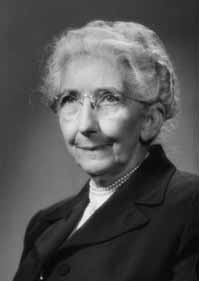 The second important female figure in Texas Tech
history was Mary Woodward Doak, who would serve as both the Dean of Women
and a professor in the English Department from 1925-1945. In 1928, her enthusiasm for a recent
visit to the British Museum caused her to vocalize the need for a museum at
the college and she enlisted the support of other faculty members, most
notably John C. Granberry, whose contact with professor William Curry Holden
led to the establishment of the Museum of Texas Tech in 1929. The first women’s dormitory would
later be renamed Doak Hall to honor her for all her contributions to the
college.
The second important female figure in Texas Tech
history was Mary Woodward Doak, who would serve as both the Dean of Women
and a professor in the English Department from 1925-1945. In 1928, her enthusiasm for a recent
visit to the British Museum caused her to vocalize the need for a museum at
the college and she enlisted the support of other faculty members, most
notably John C. Granberry, whose contact with professor William Curry Holden
led to the establishment of the Museum of Texas Tech in 1929. The first women’s dormitory would
later be renamed Doak Hall to honor her for all her contributions to the
college. 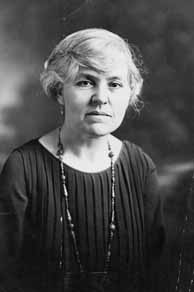 The third woman important in women’s history at Tech
was Elizabeth Howard West, a spunky and driven librarian whose notable
career included working at the Library of Congress and serving as the Texas
State Library archivist from 1911-1915. Her election to State Librarian in
1918 made her the first woman department head in the Texas state government.
The limited space and resources allotted to Tech’s first library in 1925 was
a huge challenge for West to overcome. Faculty members loaned their own books to students to help cover the shortage of
available research material. Ruth Horn Andrews, daughter of the first Tech president and a Tech graduate,
described the library as a “ … repository for everything else that
expressmen and janitors did not know what to do with… when some sort of
order was resolved from the chaos, and a few books began to accumulate,
there was not space for them… students taking notes from reference books
sometimes had to stand." (1) West herself helped ring the campus Victory Bells when funding for a
freestanding library building was passed in 1937.
The third woman important in women’s history at Tech
was Elizabeth Howard West, a spunky and driven librarian whose notable
career included working at the Library of Congress and serving as the Texas
State Library archivist from 1911-1915. Her election to State Librarian in
1918 made her the first woman department head in the Texas state government.
The limited space and resources allotted to Tech’s first library in 1925 was
a huge challenge for West to overcome. Faculty members loaned their own books to students to help cover the shortage of
available research material. Ruth Horn Andrews, daughter of the first Tech president and a Tech graduate,
described the library as a “ … repository for everything else that
expressmen and janitors did not know what to do with… when some sort of
order was resolved from the chaos, and a few books began to accumulate,
there was not space for them… students taking notes from reference books
sometimes had to stand." (1) West herself helped ring the campus Victory Bells when funding for a
freestanding library building was passed in 1937.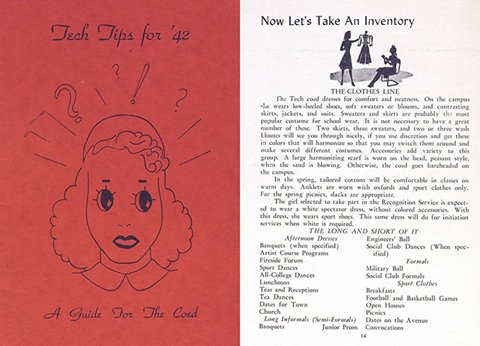
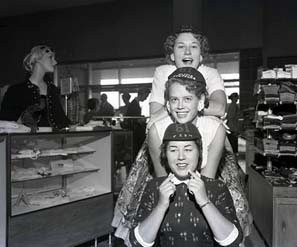
Tech alumni that attended before the mid-1970s will recall wearing special beanies nicknamed Fish Caps. It was a rite of passing to go down to Hemphill-Wells to buy one's cap and then decorate it. The University Achives has 3 of these caps, each of different decades, in our holdings.
Longer biographies on the women pictured above as well as other aspects of Texas Tech women's history can be found at the link listed below.
Back to the University Archives Texas Tech Women's History Page
